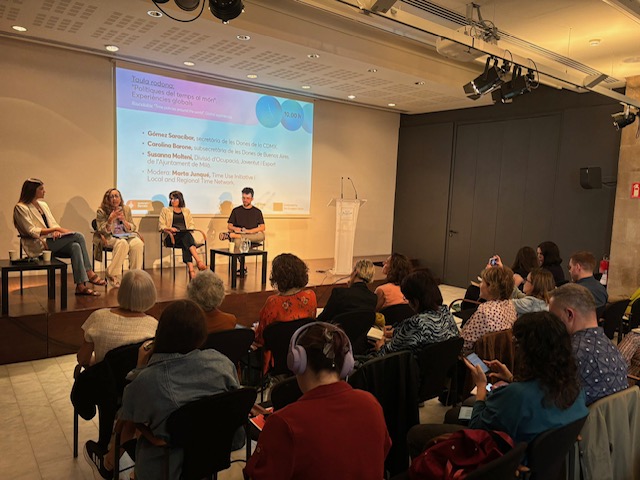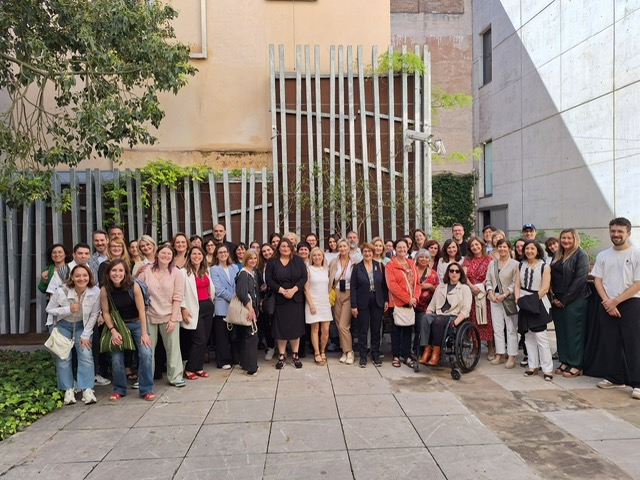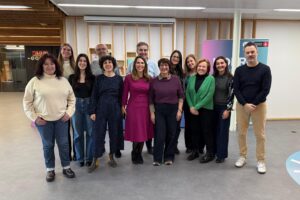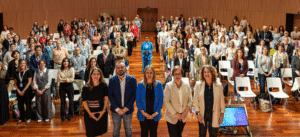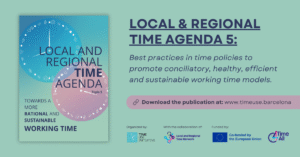- More than 500 people have participated in the Summer School of Time, the first European training program on time policies that has shown time policies are an essential tool for addressing time stress (which includes time poverty) as well as the increasing interest of citizens and social organisations in time policies, that are already at the forefront of the political agenda as a transversal and key element to the 21st century transformation.
- We have a problem with time: time poverty is suffered by 20% of European citizens, reaching 34% in the case of women with children. Outside of productive and caring work and sleep time, they do not have a single minute of leisure. Time policies are a tool to address this problem and help achieve a better time organisation.
- The School has been offered in two different formats, depending on the audience: the Citizen Time Summer School online (10-12th June), organized by the Time Use Initiative, with over 300 participants from 38 countries, and the on-site School in Barcelona (13-14th June) addressed to local governments with over 60 participants and delegations from all around Europe.
The Time Use Initiative, a pioneering organization in the promotion of the right to time, and the Barcelona City Council, a leader in promoting time policies, have taken a further step with the organization this June of the first School of Summer of European Time. The School, framed within the Time4All project, has been a unique opportunity to share both theoretical and practical knowledge about time policies and the right to time in order to move towards a healthier, more equal organization of time, efficient and sustainable.
First Citizen’s Summer School of Time
The online sessions, that are can be watched here, opened to the citizens and socio-economic organizations, began on June 10 with the session Time Policies, key policies for the 21st Century, with the interventions of local and international organisations and experts on the topics of Time & Care; Time & Sustainability; Time & Social-Economic Impact and Time policies at a local level . Marta Junqué, Director of the Time Use Initiative, made it clear in the session introduction: “we have a global social problem: more than 40% of Europeans are stressed at work and time poverty is affecting everybody, especially women with children as 35% of them have time poverty; the solution is to reformulate our time organisation.”
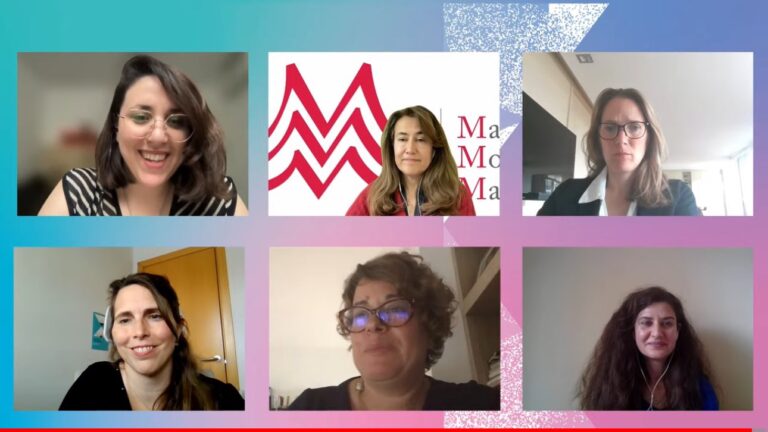
Maria Nikolopoulou, Vice-president of the Equality group at the European Economic and Social Committee, talked on the connection of time with democracy quality: “at the European Union level, we identified the lack of time as an obstacle for poor public participation and this shall be addressed within an action plan” “Giving people the time to get involved would not only improve the quality of decisions but also help elective representatives, administration, and the quality of our democracies”. She also explained how time policies are related with productivity “In the current digitized times, productivity is linked to the efficiency in the use of time; a better time organisation will have a positive impact on individuals but also in our communities and companies performance”.
Fanny Magini, Partnerships and Advocacy Expert at the City Resilience Global Programme of UN Habitat, connected time with sustainability: she referred to chrono-urbanism as the integration of time management into urban planning, considering how city schedules affect the daily lives of its inhabitants and seeking to optimize the distribution of time in urban space to improve quality of life, efficiency and sustainability; an example of this would be organizing work and transportation schedules together. She also pointed at how time must be approached to have a positive impact on the environment, as, for instance, a better organisation of public transportation could reduce carbon emissions.
Marina Lafay, Councillor of the Strasbourg City Council, explained why time policies are essential, especially at the local level, and how they can help us make a city face all the challenges of the 21st century. One of them is gender inequality, that is being addressed by public care services, on demand child care, and other programs, such as a gender sensitive budget; another one is related with a more sustainable mobility, with projects such as the 15 min city, all of them developed in Strasbourg, current World Capital of Time. “Small scale projects are sometimes the ones with the biggest impact in our daily life; the local level can inspirate the state level action”.
Johanna Schima, Vice-president of Make Mothers Matter, explained the link between time poverty and the motherhood penalty, the discriminations women encounter when they become mothers. “Unpaid care work is essential work that sustains families and societies but, in Europe, mothers are the ones who undertake most of the house work (79%) ; 49% of women and only 6% of men are in charge of personal and physical care of their children; this unequal distribution of care responsibility has implication for mothers, affecting their pay and pension gaps, employment opportunities, improvement in their professional skills, participation in social activities, etc.” she said. In front of that, Make Mothers Matter claims for a more equal distribution of care work by recognising, reducing and redistributing it.
To wrap it up, this first session showed time policies’ interaction and huge impact on key areas in our daily lives, such as care, gender equality, sustainability, economy or local policies, and that we need political will at all governance levels in order to promote them as well as updated data on time use.
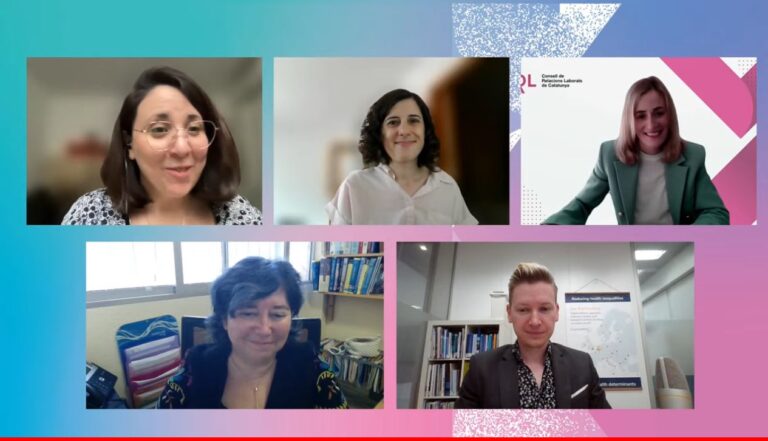
Returning to our natural time for a healthier life
In the second session on Tuesday 11 June, we introduced the concepts of chronobiology and why it is important to respect our circadian rhythms, as well as of the importance of a balanced time routine that promotes healthy habits, adequate rest, and digital disconnection. The need of ending with seasonal clock change, and returning to natural time, to be addressed through political decissions, was also requested.
Maria de los Ángeles Rol de Lama, Professor at the University of Murcia, explained how our circadian system determines which moment of the day we feel most comfortable to be physically or mentally active an on how it can be disrupted by external actors such as exposure to light at night or lack of light during the day; this can provoke serious effects on our health such as metabolic syndrome, cognitive and affective impairments, cardiovascular disease, sleep and reproductive distress, or even cancer.
She also talked about our different chronotypes, which is our tendency to morningness or eveningness and that can vary by gender, genetics or age; she pointed at the importance of trying to synchronize our schedules with our chronotypes, so as to improve our health and well-being. She also introduced the term of social jet-lag, provoked by sleep deprivation “that’s why it is important to keep regular sleep habits”
Diego Golombek, Plenary Professor at the University of San Andrés, CONICET, and Senior Researcher and Director of the Interdisciplinary Time Laboratory (LITERA), talked about the circadian cities, cities designed to take into consideration our circadian clock; “our 24/7 society tends to break the biological clock; we sleep less and less, 1 hour less than 50 years ago and 2 hours less than 100 years ago”; our cities should take time into account in order for citizens to be healthier and more efficient, as well as for improving economic performance; “we shall then consider our body time and our planet time, ending clock change and going back to natural time zones; we shall also reduce light and screen use at night, and rethink school and work timing; as we have the right to rest we claim for the right to chronocities”.
Hannes Jarke, Project Coordinator and Mental Health Policy at EuroHealthNet, talked about how can public health policies address the challenges of unhealthy habits that we regularly pose in our biological clock; one of them is regulating working time, as with the Working Time Directive (Directive 2003/88/EC), or assuring the right to disconnect, a part of the European Pillar of Social Rights, but to aligned yet around Europe. “Cross-cutting policies are needed across different thematic areas, including health, education, work, finance, sports, culture, and more, to address time poverty that deeply affects people’s mental health and quality of life all over Europe, specially of women”
Núria Gonzàlez Manzano, analyst coordinator of the Labor Relations Council of the Generalitat of Catalonia, said that digital disconnection must be a right and explained the actions taken by the Catalan government to assure it; “Helping people to disconnect from their digital devices is vital for their health and wellbeing and it is a right that companies must assure; we have created a guidelines to help to ensure this right as well as we believe in collective bargain as an essential factor for it”.
Ariadna Güell, Member of International Alliance for Natural Time (IANT) explained that “we shall set our clocks as closer to our geographical situation as possible; we propose to eliminate seasonal clock change and then to get our time zone back to natural time, as this will be beneficial for our health and economy; it’s an easy change, it only takes political will; it is now the EU institutions time on ending with DST”
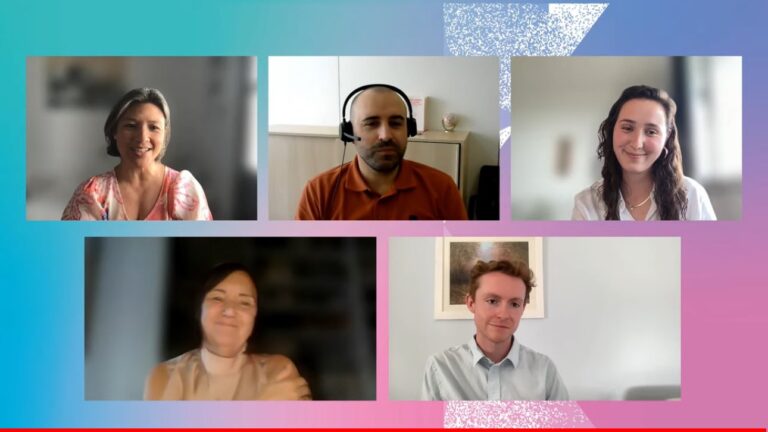
4-Day week versus fewer hours?
At the threshold of the new labour reform of our times, in the 3rd session of the Summer School of Time, we hold an interesting debate among experts on the benefits and challenges of 4 working days versus reducing the working hours.
Giovanni Casale, Senior Advisor at European Trade Union Confederation, set up the context “there is a cultural shift and the debate on labour time reduction is necessary, we have updated our working systems but not our working time; in many countries are working long hours and many have unpredictable work schedules and this provokes unbalance and this provokes stress and burnout” He explained in many collective bargaining agreements in different european countries are gradually reducing the working week, and that this is a positive sign, besides the current open public debate on the issue.
Grace Western, Consultant and Researcher at the Autonomy Institute, described the trend in Europe of a growing movement across private sector, trade unions and governments implementing a work-time reduction; for instance in the UK, 78% of workers were for a 4-Day week: “There is a reduction of working time in the last 30 years, but also more women with more care work responsibilities and the nature of work have shifted towards more intersection with the private life”, she pointed as a challenge. She went through different pilot programs promoting the 4-Day week in Belgium, Germany and Spain, with diverse results; on the question 4-day week or fewer hours, she said “there is no right answer; every worker and company will have to draft it depending on their needs and sector characteristics’
Mariluz Vega, Honorary Consultant of the Complutense University of Madrid and former official of the International Labour Organization, explained how the working time reduction proposal that is being developed in Spain is a part of a broader Time Use Law, with the goal improve workers’ life and productivity and to give more autonomy to all the parts in deciding the working schedules; “it is a progressive change: first reducing to 38,5 hours and then to 37,5 hours and we are also addressing other issues as night-work or extra-hours; we propose a flexibility in a broader manner, arranged through collective agreements and that benefits both workers and companies”.
Dale Whelehan, Chief Executive Officer of 4-Day Week Global, explained the benefits of working time reduction: “it is beneficial for society as, when you think you have more time, you feel more connected to your community and perform better in your life in general; it also benefits women as it allows a better homework distribution within men and women; it also reduces unproductive time and enables a smarter work than benefits the companies outcomes as well”.
So the conclusion to the debate was that reducing working hours will be beneficial both for workers wellbeing and efficiency but also for companies productivity and society in general, but the formula of how to do it depends on the sector characteristics and workers needs, and on the participation of all the parts involved in the decision.
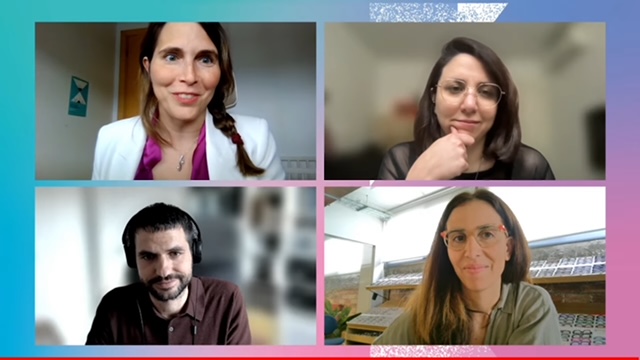
Time policies into practise
The fourth session was designed to provide a set of tools for helping private organisations move towards healthier and more efficient ways of organising their time.
To introduce the session, Marta Junqué, director of the Time Use Initiative, explained how structural sleep deprivation in our societies that leads to losses of 1-2% of the GPD and time poverty of most of the workers causing mental and health problems leading to less productivity “we need to improve time management in our organisations”
She explained the Spanish case with time that has lead to the approval of a Time Use Law and she presents the 5 key areas to improve time organisation within organizations to be found in our publication Transforming working time towards a more balanced time organisation.
Then two best practises of companies that have implemented time policies within their organisations were presented. First, Alicia Torra , HR Director at Etnia Barcelona presented the measures to improve time organisation in her company, that go from flexible working hours, 30 minutes lunch break or 1 day working from home, to having their own in-house restaurant, and that have proven to be helpful regarding workers wellbeing and efficiency.
Pau Domíngo, from Basetis, an awarded company for its innovative time policies, explained that “we have a mission to put people first; in this frame we have developed time policies, including full flexibility in working hours or full flexibility in remote work, that have proven to be beneficial to workers and to the company in general”
After the practical cases, Lia Barrese from the Time Use Initiative, presented the Self-assessment Questionnaire for organizations, a diagnostic tool designed to evaluate and enhance time management practices within an organization. It aims to identify strengths and areas of improvement for how an organization manages time, promotes work-life balance and enhances employee well-being, to be found here.
As a conclusion, there are already many companies and organizations implementing time policies but there is a lot of room for improvement for most of them, so implementing an action plan to address the challenges of a new time organisation appears as one main solution.
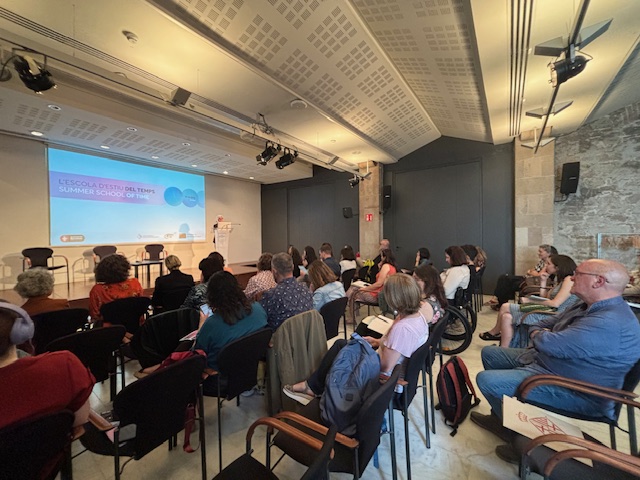
Summer School of time for local and regional entities
The on-site Summer School of Time was focused on implementing time policies from the local, metropolitan, and regional levels. Hosted by the Barcelona City Council on 13-14th June at Picasso Museum, the sessions were designed for public officials and representatives from local governments.
On the first day, Inma Moraleda, former Member of Barcelona City Council.(1995-2015) and currently director of the Mayor’s Office of Santa Coloma de Gramenet went through the 21 years of time policies in Barcelona City Council. the Time Use Initiative presented the Self-Assesment Tool for Municipalities, a diagnostic tool to evaluate and enhance time management practices within local governments, by identifying strengths and areas of improvement.
In the second day, we could enjoy the expertise of Caren Grown, Senior Fellow, Center For Sustainable Development, the Brookings Institution, who explained how time policies have evolved since the 90s and are currently interacting with other agendas such as the gender one or the fight against poverty in the world, becoming now transversal worldwide policies.
We also had the chance to learn about global experiences of time policies implemented at a local level such as the successful ones from Buenos Aires or Mexico City, currently in train of implementing a Welfare Law including time and care work perspective.
The First Summer School of Time proved time organisation is at the base of our welfare and efficiency as individuals and societies as well as the increasing interest of citizens and social organisations in time policies, that are already at the forefront of the political agenda as a transversal and key element to the 21st century transformation.
